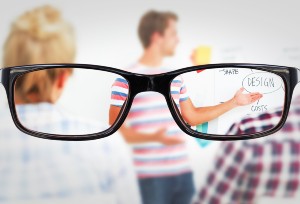We’re All Augmented and That’s Okay

By: Ben Johnston and Luke Trayser (Don Johnston/Learning Tools)
Scenario: Let’s say you just went back in time 5,000 years. Sayonara to the robot vacuums, the smartphones, and the cars. And while we’re saying our goodbyes, let’s also bid adieu to eyeglasses, central heating and air conditioning, and indoor plumbing. Yikes.
What’s the point of sending you back in time? We wanted to create a fair world, of course. One where everyone is on an even playing field. No accommodations. No augmentation.
Just a human utopia.
We just created that fair world.
Or did we?
You’d quickly find that there was not much equality to be found 5,000 years ago. If you had glasses or contact lenses, your eyes would quickly be inferior. If you relied on a medication or two, those would be gone and your health would quickly be at risk. And you’d also compete for resources with beings who are stronger, faster, or simply more acclimated to this world than you.
You see where we’re going with this. Augmentation isn’t the great separator. It’s the great equalizer.
So Why Do We Fight Against Augmentation?
Okay, back to the present day. Welcome back. Glad you made it.
Do you ever wonder why people so adamantly push back against many accommodations and most augmentation? We’ve thought a lot about it, and there appear to be four core reasons.
1. We’re afraid.
If you want evidence of this, look no further than Hollywood. Some of the most famous stories in cinema revolve around our own deep-rooted fear of augmentation. Science fiction in particular taps into this, with tales of heartless robots like HAL in 2001: A Space Odyssey, heartless realities like The Matrix, and nearly-human-yet-still-heartless creations like the ones in Ex Machina. These themes tap into a deep fear and distrust of technology.
Bottom line: there’s a line where our sense of fear spikes. It shouldn’t be ignored. Rather, we should focus on the aspects of technology that are bringing humanity forward.
(And for the record, it’s not all augmented doom and gloom from Hollywood. The Iron Giant, an underseen gem that rivals Pixar’s best, presents a story about a robot who saves humanity at its own expense.)
2. Stunted skill development
“Augmentation shouldn’t take the place of skill development!” We hear this a lot, particularly with Math. Well before they pick up a calculator, students learn fundamental number sense. And when it comes to reading, accommodations are not even mentioned until late elementary school at the earliest. Why? There are hopes that students will catch up on their own.
This is logical, but it comes with a problem. Starting in the elementary grades, students need to use their newfound reading skills to learn. And if they can’t read, they miss out and fall further behind by the day. How will they keep up with grade-level curriculum while in reading intervention?
Some students do indeed catch up, but many more have a multi-year gap in content learning. It’s near-impossible to fully catch up. Remember, content learning and communication is largely the reason why we learn to read in the first place. For students who can’t read at grade level, they may never discover Greek tragedies, adventure tales from the Mississippi, and why Archimedes leaped out of the bath with a shout of “EUREKA.” And when it comes to Math, story problems are difficult enough to solve without a reading disability. The subject should test logic and problem-solving abilities, not rest on reading comprehension.
If you want our take on the timing, reading accommodations are remarkably helpful when students need to access grade-level content-area materials. When they’re reading to learn, in other words. Conversely, intervention is highly useful when learning to read. The two can and should co-exist.
3. It’s new.
“This is the way we’ve always done it” is a philosophy that’s alive and well. It resides in every one of us.
Whenever we’re confronted with something new that has the potential to shake up our lives, we approach it with caution. We fear it and we fight against it. And it might even be a positive thing! We effortlessly talk ourselves out of a great new job, or a wonderful new opportunity, or a method of working that skyrockets our efficiency and productivity all because it’s new and we don’t like it.
Change is hard, and augmentation and accommodation are essentially nonstop change factories. But once you become aware of the fact that your body will always resist the new in favor of the comfortable, changes are a little easier to make. And at that point, there’s one final hurdle to jump.
4. Fairness
 The concepts of fairness and equality are at the root of most anti-accommodation sentiment.
The concepts of fairness and equality are at the root of most anti-accommodation sentiment.
Take eyeglasses, for example. It’s speculated that before they were invented, people with vision impairments (61% of the world population today) had a lower life expectancy. It makes sense. Quick, is that a vine or a snake?
Then eyeglasses were invented. Early on, sure, it gave people who wore them an advantage over those who couldn’t afford them or access them. But over time, that perceived advantage evaporated once glasses became accessible to all. The asymmetry—and unfairness—dissolved.
Elevating Humanity
In other words, once accommodations become universal and individuals have the choice to use them or not, any concerns  vanish like a leaf in the wind. All that’s left is acceptance, adoption, and convenience.
vanish like a leaf in the wind. All that’s left is acceptance, adoption, and convenience.
We’re seeing this right now with home automation. Earlier this century, simple home automation like centralized light switches was reserved for people with disabilities or the absurdly affluent. It was cost-prohibitive for anyone else. But now we’re seeing unprecedented growth in home automation—from door locks to lighting to personal assistants.
It’s an encouraging development. We see this “Universal Design for Learning” concept really playing out. At Don Johnston, we call our tools “Human Learning Tools.” This is no accident. We don’t want to lose the humanity of what we do. We see the potential of technology to bring out each of our superpowers because it elevates all of humanity.

